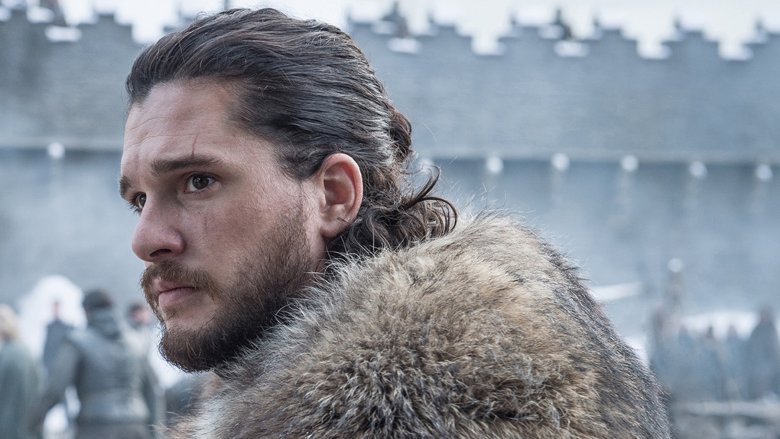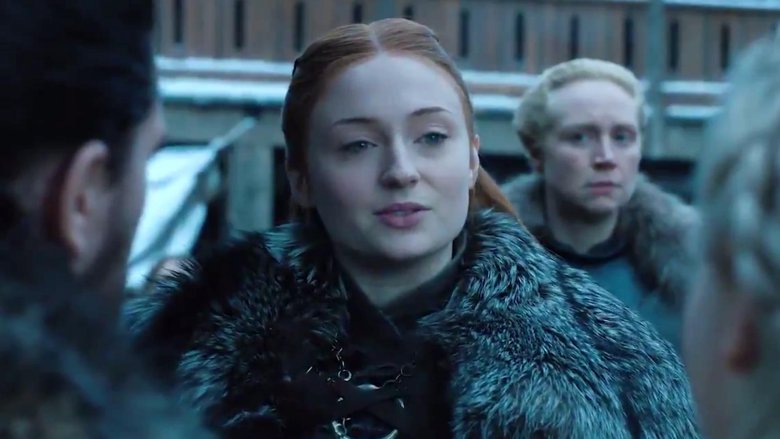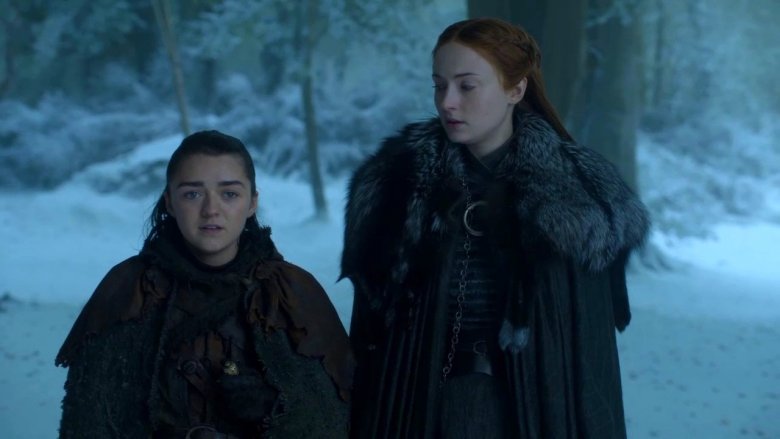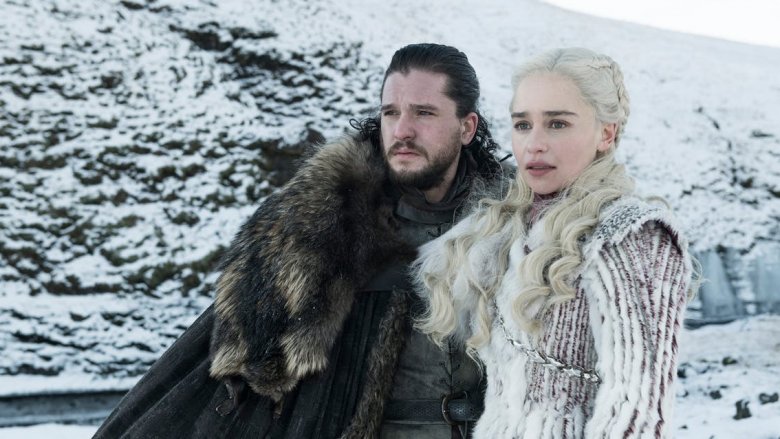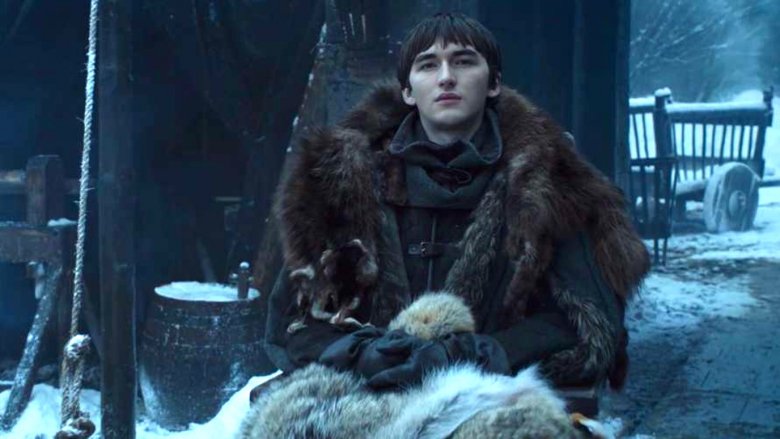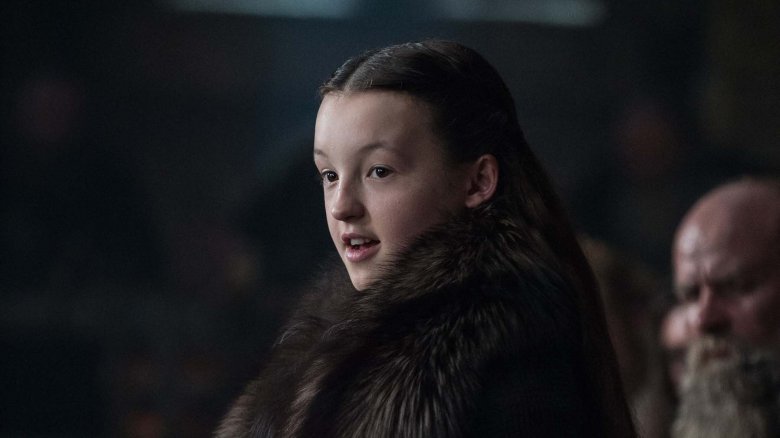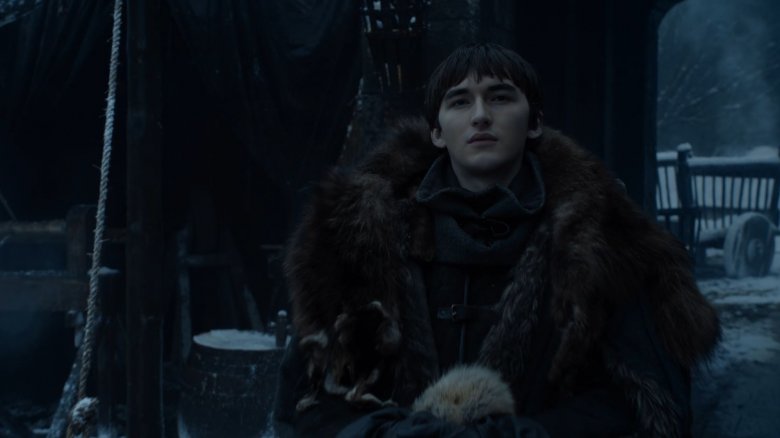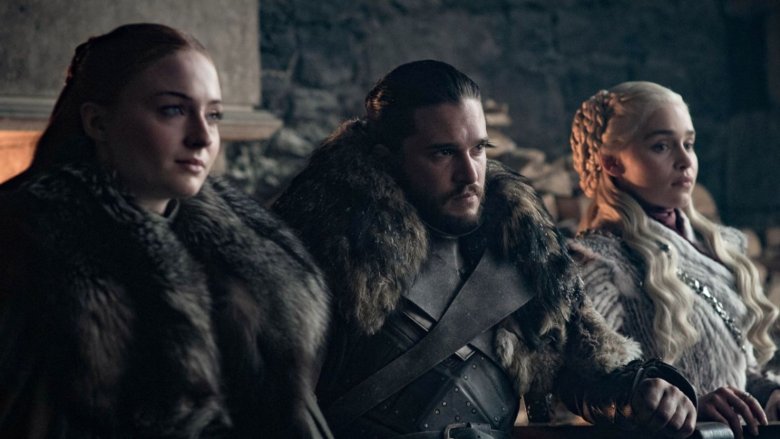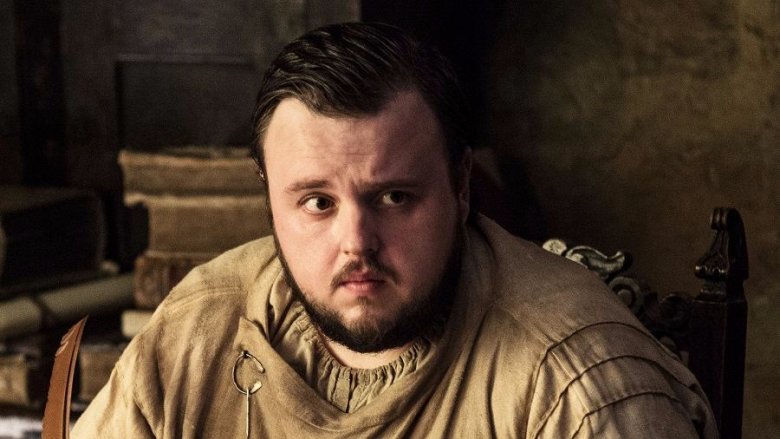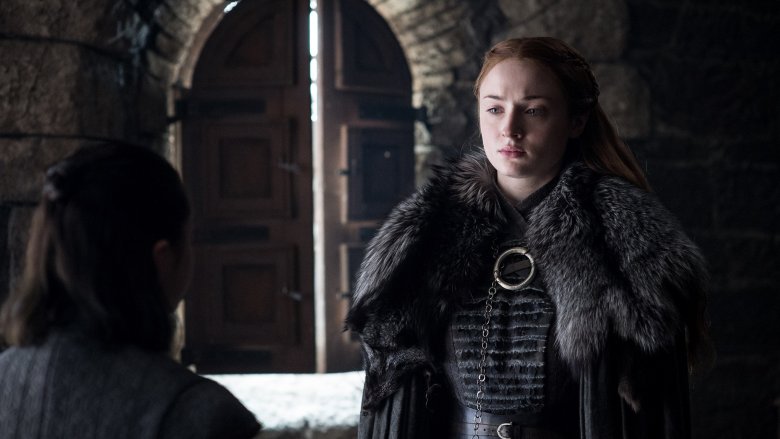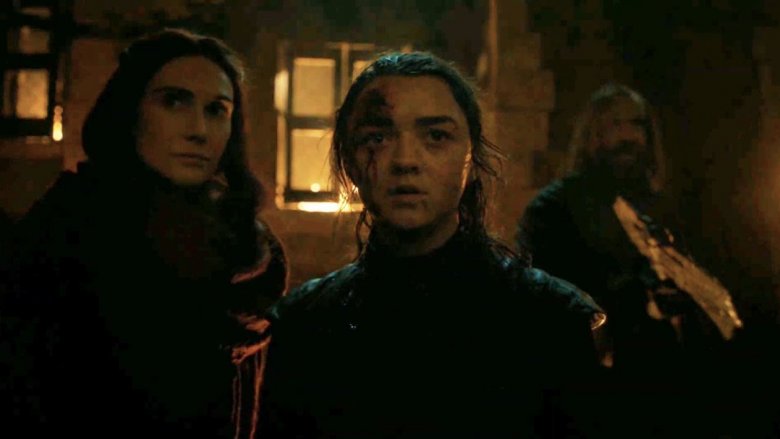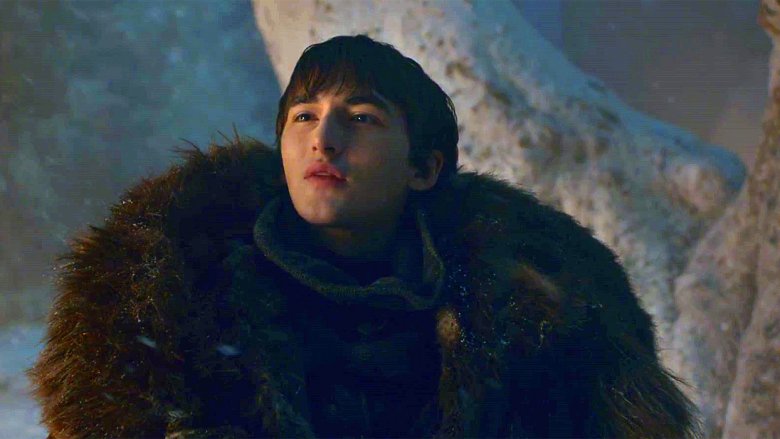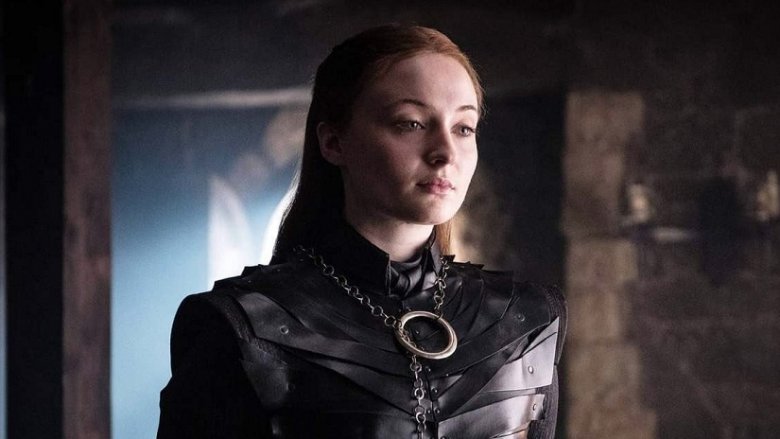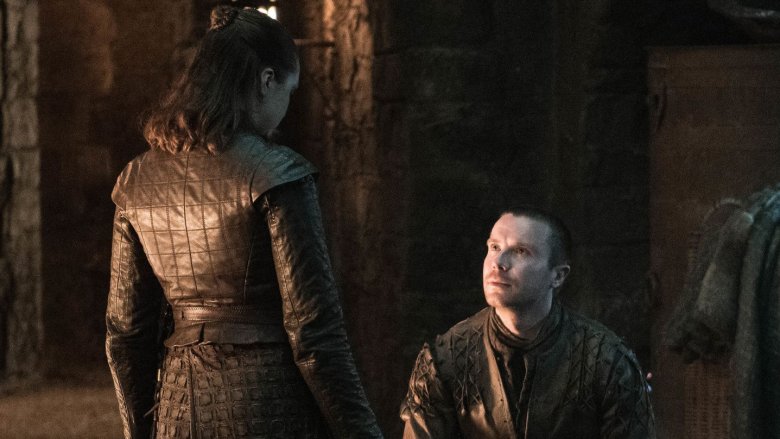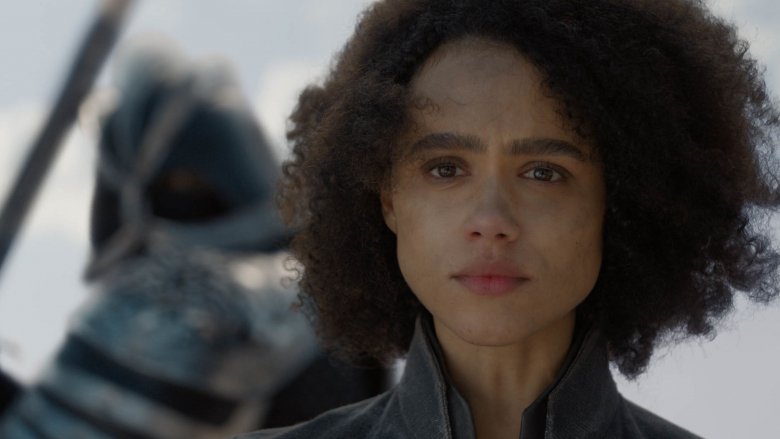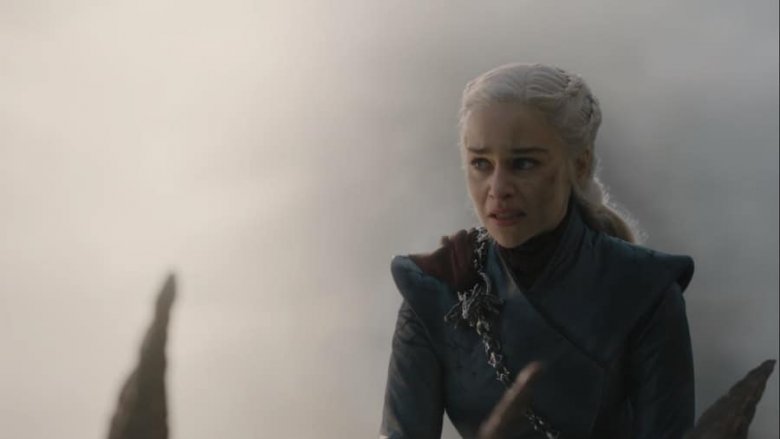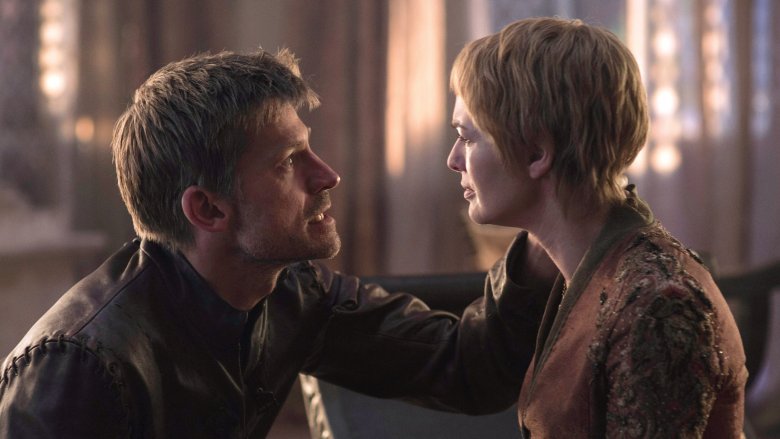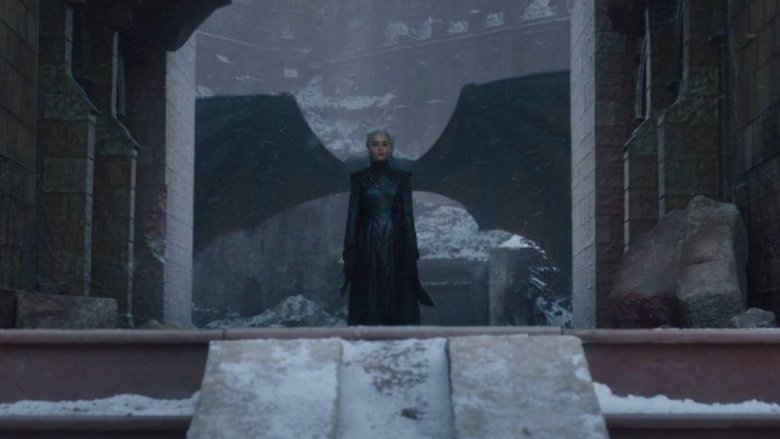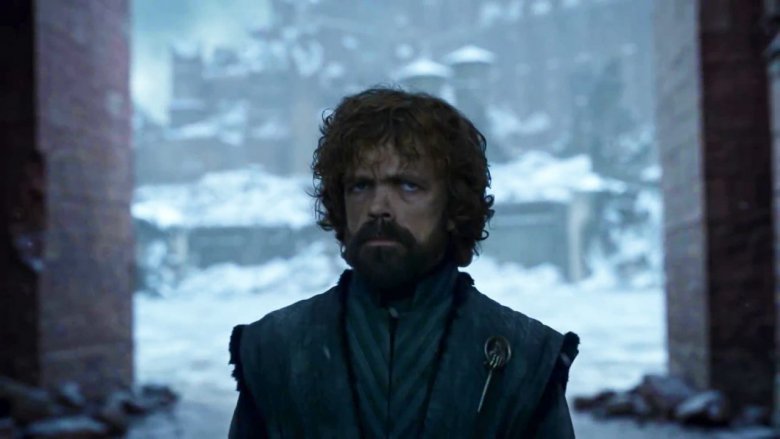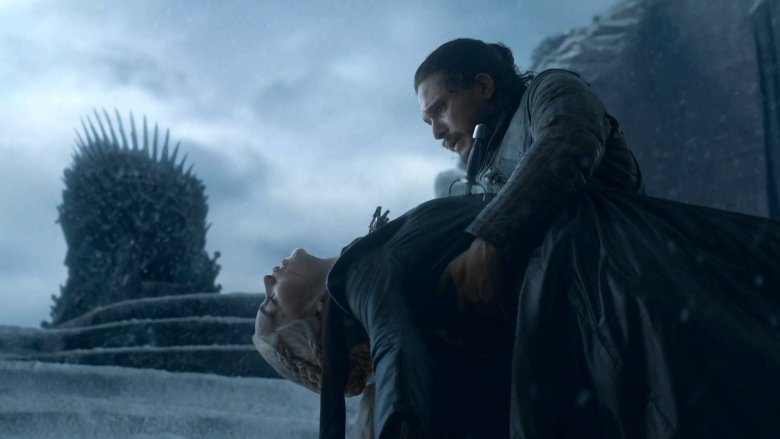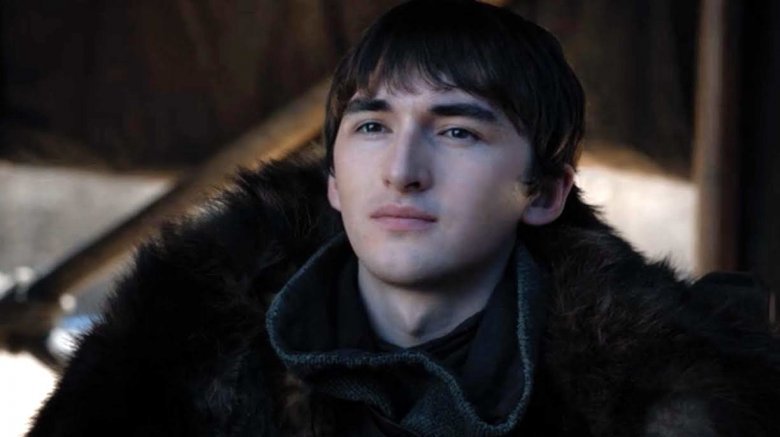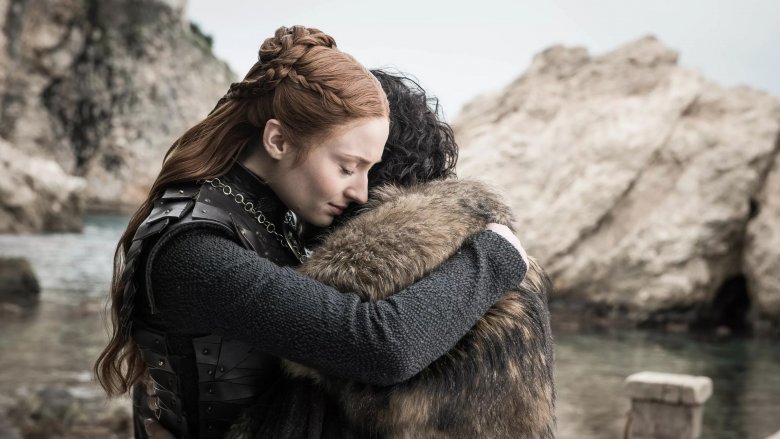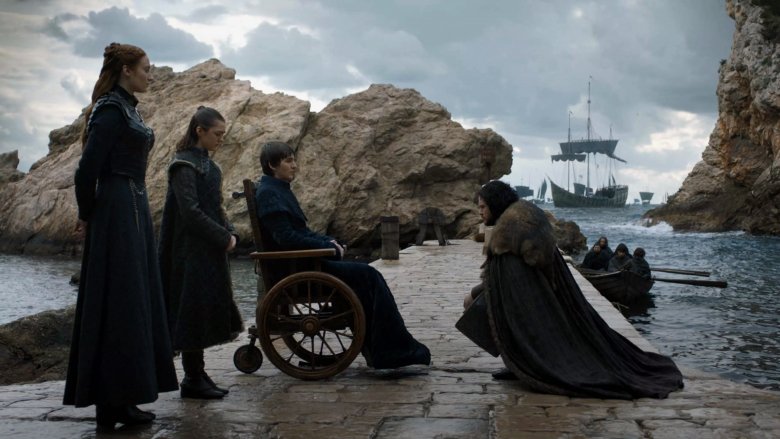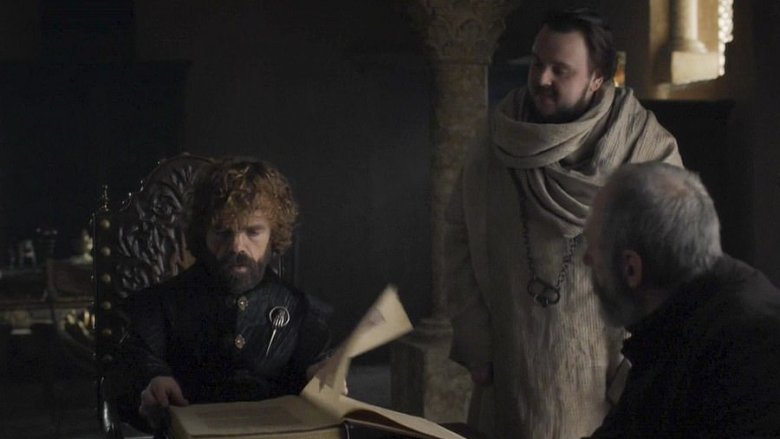Lines In The Final Game Of Thrones Season That Mean More Than You Realize
Game of Thrones is one of the densest and most complicated shows on television, with enough mythology to make any viewer's head spin and so much background information that it requires charts and graphs to keep everything straight. On top of that, creators David Benioff and D.B. Weiss make sure that each script is layered with meaning, letting fans watch and re-watch episodes so that they can keep finding clues in every line and moment.
With so much ground to cover, the show's final season is sure to follow in this tradition, with plenty of lines leading up to the long-awaited conclusion — so to help you stay on top of it all, here's a look at the most important lines from the final season of Thrones. Each of these lines carries more meaning than most might realize, so remember to pay close attention to the dialogue as the show moves toward its epic conclusion — even the shortest sentences might have more meaning than you think.
Northerners don't much trust outsiders
After a largely silent introduction during which Daenerys (Emilia Clarke) and Jon Snow (Kit Harington) finally arrive at Winterfell to meet the rest of the Starks and convince the Northerners to join their cause, one of Jon's first utterances to Daenerys is "Northerners don't much trust outsiders," as the two of them look out at the glowering, distrustful citizenry laying eyes on the Dragon Queen for the very first time. Daenerys doesn't exactly impress either Stark sister, especially not Sansa (Sophie Turner), who clearly doesn't trust this foreign queen, despite Jon's ringing endorsement.
This isn't a good sign for Daenerys, but it's potentially a bad sign for Jon as well. As viewers know, he isn't a Stark bastard at all, but the Dorne-born son of Lyanna Stark and Rhaegar Targaryen (Daenerys' brother), giving him the biggest claim of all to the Iron Throne. It's possible that, once the North discovers Jon's true parentage, they'll abandon him too — despite his utter devotion to protecting the North, it appears that Jon, born as Aegon Targaryen, is the ultimate outsider.
I'm defending our family. So is she
The reunion between Arya Stark (Maisie Williams) and Jon Snow was one of the most anticipated of all going into this season; after all, Jon gave Arya, now a formidable faceless killer, her very first sword, and though their time together in the first season was short-lived, it was clear to viewers that the two had an intense bond. When they meet again in the Godswood at Winterfell, it provides Thrones with one of its biggest and most satisfying emotional moments, even evoking a rare smile from Arya, who has hardened considerably over the course of the show (to say the least).
Once the two broach the subject of Sansa and her obvious lack of affection towards Daenerys, Arya defends her sister, much to Jon's surprise, especially considering that the two constantly butted heads as young girls. Standing her ground, Arya says of Sansa, "I'm defending our family. So is she," even though she has no idea that the man standing in front of her isn't part of her immediate family — though he's her first cousin, he's technically a Targaryen, not a Stark. When Jon finally shares the truth of his lineage with Arya and Sansa, Arya immediately agrees to honor his request to keep it a secret — but Sansa, acting on her distrust of Daenerys, lets it slip to Tyrion, knowing full well it'll set a chain of events in motion that can only be problematic for the Mother of Dragons.
We could stay a thousand years. No one would find us
After their first tryst on the journey from Dragonstone to Winterfell at the end of the seventh season, fans have been waiting to see what's going on with Jon and Daenerys, and this episode gave viewers a peek into their (pretty weird) dating habits, which include totally normal things like riding dragons through the sky. When the two land to give the dragons a break (leading to an incredible moment when the dragons give Jon the stink-eye for kissing their mom), Daenerys spots a nearby cave, and, with a smirk, says to Jon, "We could stay a thousand years. No one would find us."
This wouldn't be the first time Jon spent some time cavorting in a cave, but Daenerys' comment brings back memories of Ygritte (Rose Leslie, who is also Kit Harington's real-life wife), a Wildling that Jon once fell in love with. The doomed couple had their first intimate moment in a cave, with Ygritte suggesting they stay there forever. With the secret truth about Jon and Daenerys now starting to spread (specifically, that she's his aunt), their relationship is likely just as doomed — maybe this time, Jon should have listened to the lady and stayed in the cave.
I'm waiting for an old friend
Bran Stark (Isaac Hempstead-Wright) has been, for lack of a better term, completely weird ever since he took up the mantle of the Three-Eyed Raven, and he didn't disappoint during the season premiere, lurking all over Winterfell to say cryptic things to the main characters or to simply blurt out that a portion of the Wall has been destroyed by the Night King's new ice dragon (a piece of information that, oddly, doesn't seem to trouble anybody very much). At one point, he runs into Sam Tarly (John Bradley) in the courtyard of Winterfell one evening, and when Sam asks what Bran is up to, he tells Sam he's "waiting for an old friend."
At the end of the episode, he's in the courtyard to witness the arrival of Jaime Lannister (Nikolaj Coster-Waldau), who has risked his life to turn on his sister Cersei (Lena Headey), sociopath and current occupant of the Iron Throne, in order to work with their brother Tyrion (Peter Dinklage), Jon, and Daenerys to save humanity. However, the last time Jaime saw Bran, he was shoving him out of a high window after Bran caught Jaime and Cersei in a rather compromising position; though Bran didn't die, the fall cost him the use of his legs, and especially considering Bran can now see through all of space and time and he doubtless knows what else Jaime has been up to, he surely has plenty to discuss with Jaime as the season continues.
The "old friend" Bran is waiting for, however, turns out to be Theon, who makes his way back to Winterfell after rescuing his sister Yara from her kidnapping at the hands of their uncle Euron. Driven by a need to redeem himself for his many duplicitous acts earlier in the series — including taking Winterfell from the Starks and faking Bran and Rickon's deaths — Theon volunteers to lead the team protecting Bran from the Night King during the climactic battle with the White Walkers.
You left the North a king and came back a... I'm not sure what you are now
When Jon Snow returns to the North with Daenerys Targaryen in tow, he's met with plenty of disapproval, but one of the loudest voices upon his return is that of Lyanna Mormont, the diminutive but tough Lady of House Mormont who has unequivocally backed Jon since the Battle of the Bastards and has become one of his biggest champions. In fact, Lyanna was instrumental in naming Jon as the new King in the North in the show's sixth season.
When members of the hall of Winterfell are confused as to whether they should refer to Jon or Daenerys as "Your Grace," Lyanna stands up and speaks for everyone when she tells Jon, "You left the North a king and came back a... I'm not sure what you are now," going on to ask, "What are you?" Unbeknownst to Lyanna, it's a pretty pointed question, considering that between Jon's departure and return, his true parentage was revealed to the audience — and really, he's still "Your Grace," except that he's not the rightful King in the North, but the King of the Seven Kingdoms.
Almost
Bran's transition from young, naive boy to the Three-Eyed Raven has taken the better part of Thrones' run, and as he's become more and more omniscient, he's become a totally different person (or non-person, as the case may be). He's gone from just a regular boy trying to survive to an all-seeing mythical being who talks to everyone he interacts with like a college student with a superiority complex who just came back from a study abroad program. As each of his siblings reunites with Bran, they gradually figure out that he's turned a bit... well, odd, staring at him strangely and letting each other know that their brother has changed quite a bit since they all last saw him. Neither Sansa nor Arya seems to be able to make any sense out of his proclamation that he's the Three-Eyed Raven, although they do use his talents to hold Littlefinger accountable for his crimes.
In the season eight premiere, Jon is finally reunited with Bran after a few near misses. As Jon hugs a still and thoroughly unemotional Bran, he tells Bran he's finally become a man. "Almost," Bran replies, probably because he's now an all-knowing being who seems all but certain to hold some important — and still unseen — keys to the Game of Thrones endgame.
The things we do for love
Jaime Lannister's return to Winterfell brings with it some fairly awkward reunions, considering that during Jaime's last visit to the Northern castle, he tried to kill a child — specifically, Bran Stark — by shoving the poor kid out of a window simply because Bran had the bad fortune to walk in on Jaime and his sister, Cersei, during a way too intimate moment. However, Jaime has plenty of other sins under his belt, including the murder of Daenerys' father, King Aerys II Targaryen (frequently referred to as "The Mad King"), as well as his long-running incestuous relationship with his sister. Of course, nobody besides Bran even knows that Jaime is the man who tried to kill him all those years ago.
As Jaime stands in front of both the Stark and Targaryen factions at Winterfell, ready to answer for his crimes, he comes face to face with Bran himself, and seems to be steeling himself for the moment where Bran reveals one of Jaime's worst moments, but that revelation never comes. Instead, Bran simply says, "The things we do for love," echoing Jaime's exact words from the moment where he pushed a young Bran out of that tower, ultimately letting Jaime know that despite Bran's long journey to become the Three-Eyed Raven, he'll never forget what Jaime once did to him.
Men do stupid things for women
In an effort to bond with Jon's family, Daenerys pays a visit to Sansa during the season's second episode, asking if the two can speak alone for the first time since Daenerys' arrival at Winterfell. The dragon queen's time at the Stark family home has been fairly fraught thus far, and Sansa, for her part, has been quite skeptical of this Southern newcomer, frustrated by her relationship with Jon and distrustful of her overall intentions.
During their first private meeting, Daenerys seems to charm Sansa a bit, telling her that she has traveled all this way because of her love for Jon, finally showing both Sansa and the audience a softer, more genuine side of herself. Sansa does temporarily warm up, but is still wary, saying that "men do stupid things for women," referring specifically to Jon bending the knee to Daenerys and allowing her to take control of the North (a notion that Sansa is clearly incredibly unhappy about). In the end, Sansa's words are basically a thesis statement for half of the things that have happened on Thrones – from the attempt to murder Bran to most of Littlefinger's schemes to Jon's super-dangerous scheme to capture a lone wight, a lot of the incredibly huge missteps in this story have been so that a man can win over or impress a woman. This one succinct sentence sums up some of the show's greatest conflicts.
That's what death is. Forgetting
On the eve of the epic Battle of Winterfell, most of the characters gather together for one last night as they consider their own mortality, sing, drink, and try to accomplish everything they might want, in case the army of the dead overtakes them before dawn. During a discussion by the fire, Sam Tarly chimes in, saying that the loss of memories is the worst fate of all, telling his comrades, "That's what death is. Forgetting." After a short monologue where Sam tells his friends that not only might they die, but their names and legacies might be lost to time, it becomes clear that after his time at the Citadel, Sam is preoccupied with making sure that he and his loved ones live on, no matter what happens in battle.
This all fits in nicely with one of the most popular theories about Sam himself, which is that thanks to his education at the Citadel and ambition to become a Maester, the series will conclude with him writing the titular "song of ice and fire," transcribing the heroic acts of those around him so that they can live on forever. After monologues like this, it certainly seems even more likely that Sam will be the one to chronicle the series' entire throughline. Since he's not a strong fighter or contender for the throne, it seems like this is the perfect role for him to play as the epic saga ends.
Stick 'em with the pointy end
Considering the Battle of Winterfell took place at the ancestral home of the Starks, it would have been kind of confusing if the entire family wasn't front and center. With each member of the family serving some sort of purpose, from Jon atop a dragon to Bran waiting in the weirwood, the biggest juxtaposition came between Sansa and Arya, since the former was stuck down in the crypts with babies and eunuchs while the latter was positioned in the battlements with a full arsenal of weapons at her disposal.
Sansa and Arya's relationship certainly started off rocky when they were younger, but since they reunited in season 7, the two have been working together to hold the North and protect the Stark family. More than that, it's become apparent that they've arrived at a place of mutual respect and love now that they've reached adulthood. This is best shown during "The Long Night" when Sansa laments that she can't be helpful (perhaps a bit jealous of her daring, highly trained sister), and Arya gifts her with a dragonglass dagger, telling her to "stick 'em with the pointy end." Back in season 1, Jon gave a small sword (known as Needle) to a young, eager Arya with the same instructions; perhaps this moment is Arya showing her sister that she believes Sansa is every bit as formidable.
Brown eyes, green eyes, blue eyes
Melisandre (Carice van Houten) came out of the woodwork just before the Battle at Winterfell began, quickly showing off by lighting the weapons of every Dothraki warrior on the front lines (which, admittedly, is a cool flex). However, she has plenty more to do during this battle, and it's all tied to Arya Stark.
After several horrifying and grueling run-ins with wights, Arya finds a brief moment of safety alongside the Hound and Melisandre in a locked chamber in Winterfell, and for the first time in years, Arya seems about ready to throw in the towel. Luckily, Melisandre, who once told Arya they would "meet again," reminds her of a prophecy she made in season 3 during their first meeting, when she said she saw a "darkness" in Arya as well as many eyes — "Brown eyes, green eyes, blue eyes. Eyes you'll shut forever." This time, Melisandre pauses before "blue eyes," driving the point home (pun intended) that Arya is the one who can take down not just the Night King, but all of his blue-eyed brethren. Before Arya takes off, Melisandre gives her one last pep talk by reminding her of Syrio Forel's famous catchphrase, "What do we say to death?" Arya's familiar refrain, "Not today," lets both Melisandre and the audience know that she's not done fighting yet — not even close.
Everything you did brought you where you are now Home
Bran's trippy, all-seeing thing is probably wearing thin for most viewers by now, but as the battle raged at Winterfell while he was safely ensconced in the Godswood with Theon Greyjoy and the rest of the Ironborn, he could at least offer some solace to one of the show's most (literally) tortured characters. A repentant Theon, once again loyal to the Starks, volunteered himself to guard Bran in the Godswood during the battle, knowing he would likely die trying but offering his services regardless.
Die he did, but not before buying Bran a little bit of time. As thanks for his life, Bran offers Theon the absolution he's craved. While the two wait for the Night King's inevitable arrival, Theon tries to apologize, but Bran tells him, "Everything you did brought you where you are now. Home." Finally, just before Theon charges at the Night King in his final moments, Bran takes a moment to say, "You're a good man, Theon. Thank you." Between reminding him that Winterfell is his home and letting him know that even after everything, his heart is good, Bran gives Theon what he needs to die, letting the last male heir of the Greyjoys go out in peace and finally complete his journey.
You've changed, little bird
Sansa's evolution on Thrones has seen her grow from a whiny pre-teen to a consummate survivor and shrewd strategist, and as much as audiences have noticed this incredible growth and journey, the characters within the universe have as well. During the celebrations at Winterfell during the fourth episode of the eighth and final season, Sansa reunites with the Hound, who references the abuse she suffered at the hands of her late husband Ramsay Bolton, a sadistic rapist and murderer who brutalized her within an inch of her life. Once she tells the Hound she fed Ramsay to, well, his hounds, the warrior lets an impressed chuckle slip and tells her, "You've changed, little bird," remembering the meek and frightened girl he went out of his way to protect during his stint in King's Landing serving under Joffrey Baratheon.
The Hound tells Sansa that if she had left King's Landing under his protection, she never would have had to face these horrible men and worse circumstances, but as usual, Sansa has a perfect line of reasoning prepared. "Without Littlefinger and Ramsay and the rest, I would have stayed a little bird all my life," she retorts, making it clear that this little bird isn't so little anymore... and can fly just as well as anyone else.
I'm not a lady. I never have been
Arya's tryst with Gendry, the blacksmith turned lord (as well as the sole remaining bastard of King Robert Baratheon), raised a few eyebrows, but it also raised many viewers' spirits to see Arya pursue exactly what she wanted on the eve of a life-threatening battle while taking her sexuality into her own hands. Arya got what she came for, but clearly, that night meant quite a lot to Gendry as well.
After the Battle of Winterfell, where Arya proves to be the fiercest warrior of all, Gendry finds her just after Daenerys names him a trueborn Baratheon as well as the Lord of Storm's End and tells Arya he loves her, asking for her hand in marriage so she can stand by his side and become the Lady of Storm's End. Any Game of Thrones fan who's been paying attention to Arya's story knows exactly how this moment will play out, and even though she clearly cares about Gendry, she turns him down immediately, telling him, "I'm not a lady. I never have been. That's not me." Not only does this harken back to her past as a faceless assassin, it's a callback to a moment she shared early in the show with Ned, when she says "that's not me" after her father suggests she might be the lady of a great castle. Arya might have undergone quite the journey to become who she is, but she still knows what she isn't.
Dracarys
One of episode four's most heartbreaking moments comes right after the assault on Daenerys' fleet — after losing Rhaegal, her second to last dragon, to one of Qyburn's scorpion spear launchers, her ships are attacked by Euron Greyjoy. In the skirmish, Missandei, who has long been one of Daenerys' most trusted advisors, is kidnapped by Greyjoy soldiers. A former slave freed by Daenerys, Missandei is one of the most fervent followers of the Dragon Queen, whom she loves, respects, and idolizes, having followed her from one end of Westeros to the other.
Tragically, Missandei ends up losing her life so Cersei can prove a twisted point to Daenerys. Offered the opportunity to speak her last words, Missandei seems to think for a moment before responding "Dracarys." Fans of Thrones will recognize this as the command Daenerys uses to make her dragons breathe fire on her enemies, but it means even more to Missandei: the first time she ever saw Daenerys use it, the Mother of Dragons employed it against a slave owner in Astapor who once owned and abused Missandei, which ultimately freed her. Even though Missandei can't unleash dragonfire with her last words, it's one last reminder of how much Daenerys has given her and how much power and love Daenerys inspires in her subjects — as well as the burning rage Cersei has now unleashed.
Let it be fear
Since the beginning of the show, Daenerys has had one goal placed firmly in the forefront of her mind — to take the Iron Throne, no matter the cost. From her start across the Narrow Sea as the wife of Khal Drogo (Jason Momoa), Daenerys has made it her mission to take the throne of Westeros and bring justice to the world as she makes her way there. But at some point, Daenerys seems to have lost some of her righteousness and given in to her baser, crueler impulses, ending entire lineages and executing people simply because they refuse to blindly bow to her or stay on her side no matter what.
Daenerys starts the show's penultimate episode at a serious deficit, having lost both Missandei and Jorah Mormont (Iain Glen), and she acts out accordingly, torching her ally Varys (Conleth Hill) after finding out he backed Jon Snow as the heir to the Iron Throne. She then lays waste to the population of King's Landing by raining dragonfire on innocent civilians and Lannister soldiers alike. Before she even arrives in King's Landing, after being rejected by her nephew-boyfriend Jon Snow once again, she says to Jon, "All right then. Let it be fear," indicating that she's willing to take the Throne using fear, choosing violence just like Cersei did before her.
Nothing else matters. Only us
Jaime and Cersei have been inextricably linked since the beginning of the show, especially considering that at the end of Thrones' pilot, Jaime tossed a child out of the window just to protect his sister-slash-lover and their joint secret. Even after the show's seventh season, when Jaime left his sister behind after she threatened to kill him, the two always seemed inevitable. It's no surprise when Jaime leaves Brienne and his Northern alliances behind to return to his twin, and it seems like he's either returning to take her down once and for all or to fully rejoin her team.
Rejoin her he does — even though, unbeknownst to Cersei, Jaime is the one who rang the bells of King's Landing to signify surrender and save its people. But after a fight to the near-death with Euron, he still returns to his true love and queen, taking her beneath the city in a last-ditch attempt to escape. When the two find their path entirely blocked as the ceiling begins to cave in above them, Jaime tells Cersei to look at him as he holds her, reminding her, "Nothing else matters. Only us." Since the beginning, these two have stuck together without fail, and it shouldn't be overlooked that Jaime once said he wanted to die in the arms of the woman he loved. In the end, they both get their wish.
Will you break the wheel with me?
After her victory at King's Landing, Daenerys disappears for a few victory laps on Drogon before returning to her sieged and newly conquered city (notably, in the penultimate episode, she's never seen in closeup after deciding to slaughter the capital's population despite its surrender). Landing in a spectacular shot that silhouettes her against Drogon's wings, Daenerys addresses her Unsullied and Dothraki army from the ruins of the Red Keep, giving off distinctly totalitarian vibes as she commands her armies to join her in her next mission.
One might think that now that Daenerys has killed her rival queen (giving this speech, she's actually standing above Cersei's grave) and taken the capital city, she would be satisfied in her quest for world domination, but instead, she asks her armies to join her in liberating every person in Westeros, exciting her troops and alarming her closest advisors. "Will you break the wheel with me?" she asks, to an overwhelming roar, but at this point, what wheel is there left to break? Daenerys has always pledged to rid the world of injustice, but in her quest for total control of every inch of the Seven Kingdoms, it becomes frighteningly apparent that she's more power-hungry than anyone anticipated.
I freed my brother. You slaughtered a city
Tyrion stood by Daenerys' side for several seasons of Thrones, pledging to back and follow his queen no matter what, but in the immediate aftermath of "The Bells," it's apparent that their journey together is coming to an end. As Tyrion surveys the damage left behind by Daenerys and her dragonfire, he looks openly horrified, walking through the rubble of the city as he wanders past burned bodies and injured civilians. It only gets worse when he explores the ruined Red Keep, where he sent his sister and brother so they could escape the city and start a new life together, only to discover them buried together underneath a pile of rocks.
Devastated, Tyrion returns to Daenerys' side, knowing she's already angry with him for freeing Jaime from captivity before the siege on King's Landing. She tells him as much, and he responds firmly, "I freed my brother. You slaughtered a city." Despite his role as Hand of the Queen, Daenerys broke her word to Tyrion, who begged her to end the battle once the bells rang in surrender; thanks to her hotheaded and cruel decision, she loses her last advisor, with Tyrion tossing the pin signifying him as her Hand aside. Tyrion may be breaking his pledge, but it's not hard to recognize that what Daenerys did was far, far worse.
Sometimes duty is the death of love
While in captivity, Tyrion is visited by Jon Snow, who is equally troubled by Daenerys' decision to kill thousands of innocents in King's Landing, though he initially insists he's still firmly on her side. Over the course of the conversation, however, Tyrion's bluntness gets through –- he tells Jon that it was all well and good when Daenerys was destroying slavers, captors, and other evil men, but now she'll destroy anybody in her path, whether or not they truly deserve to die. "Wouldn't you kill whoever stood between you and paradise?" Tyrion asks a brooding Jon, who is clearly torn between his queen and the fate of the Realm.
When Tyrion tells Jon that love often overcomes reason, Jon responds, "Love is the death of duty." "You just came up with that?" asks a baffled Tyrion, but Jon says it actually came from Maester Aemon Targaryen, with whom Jon spent time at Castle Black (and to whom Jon is distantly related). "Sometimes duty is the death of love," retorts Tyrion, and as he leads Jon to his inevitable fate — that Jon must kill Daenerys to protect Westeros — the message seems to sink in. As Tyrion eventually says to Jon, it's a "terrible" thing, but "it's also the right thing," and by the time Jon leaves, his mind is made up.
There's nothing in the world more powerful than a good story
Eventually, the time comes to choose a new leader of Westeros, and when Tyrion is brought before a new council led by the last remaining members of the Seven Kingdoms' great houses (including an unnamed Dornish prince, long-lost faces like Edmure Tully and Robyn Arryn, and familiar characters like the entire Stark family) to stand trial for betraying the queen, it seems unlikely that the accused would be the person to suggest the next king or queen. Tyrion, as usual, is full of surprises.
Asked if he would like to rule, he immediately demurs, but having had some time to mull it over, he's made up his mind about the best candidate, a conclusion he reached because "there's nothing more powerful in the world than a good story." As everyone looks on, he continues, "Who has a better story than Bran the Broken? The boy who fell from the high tower and lived. He knew he'd never walk again, so he learned to fly." By suggesting Bran Stark as the next King of Westeros — as well as suggesting that all future rulers should be chosen by a council rather than simply born into their title — Tyrion finally breaks the wheel Daenerys fought so hard to destroy, introducing a new, more merit-based system of monarchy into the Seven Kingdoms.
Ned Stark's daughter will speak for them. She's the best they could ask for
Bran Stark, now First of his Name and the Protector of the Realm, isn't the only Stark to don a crown during Thrones' final episode. Jon Snow ends up banished right back where he started — on the seemingly obsolete Night's Watch. As Jon departs, he says an emotional goodbye to Sansa, Arya, and Bran at the port of King's Landing.
Sansa apologizes to Jon for not being able to do more for him, lamenting that the North has now lost their king, but Jon, beaming with both pride and sadness, tells her, "Ned Stark's daughter will speak for them. She's the best they could ask for." The best of both of her parents, combining Ned's sense of loyalty and honor and Catelyn's steely, practical nature, Sansa is the natural choice to lead the independent realm of the North, and in the audience's final glimpses of each Stark, she is seen attending her own coronation. Jon clearly knew what he was talking about, and wherever he spends his days, he knows he can rest easy with the North in good hands.
What's west of Westeros?
During the tearful goodbye between Jon and his Stark family, he also must say goodbye to Arya, even though he insists she's welcome to come visit him up North — Castle Black might technically forbid women from entering its gates, but Jon is pretty realistic about the fact that nobody would be able to stop her. However, the younger of the Stark women tells him she won't be able to visit, asking instead, "what's west of Westeros?"
It's unsurprising that Arya is already planning her escape from Westeros; ever since her time exploring Braavos, she's been hard to pin down, and now that the Realm is safe in the hands of her brother, it's about time for her next adventure. As she says, "no one knows" what's west of Westeros, because it's "where all the maps stop," and so that's where she heads (but not before Jon makes sure she still has Needle by her side). In the episode's closing shots, viewers see Arya one last time, arranging maps before proudly strolling along a grand ship, which turns out to be adorned with Stark sigils. No matter where she goes, she'll always have Winterfell with her.
I helped him with the title
Samwell Tarly was never a great fighter, but considering how long he stuck around throughout Thrones, it was always clear that he would have a huge role to play during the show's ending. A bookish and somewhat sheepish figure, Sam might have irritated some viewers at first, but eventually became one of the show's most beloved characters, and though he had his moments on the battlefield (including taking down a White Walker), his strength was always in his studies, from the time he did enough research on greyscale to cure Jorah Mormont's affliction to the time he helped Bran confirm Jon's true heritage as Aegon Targaryen.
This all comes to a head during the series finale, when Sam, dressed in the white robes of a Maester and a part of Tyrion's Small Council, presents the Hand of the King with an enormous book written by Archmaester Ebrose (Jim Broadbent), with whom Sam worked with at the Citadel. Confirming a long-held fan theory that Sam would write or at least help write the history of Westeros since Robert's Rebellion, Sam reveals that the name of the tome is A Song of Ice and Fire, noting, "I helped him with the title." If the role Sam was meant to play was that of a stand-in for the series' author, George R.R. Martin, that seems like a perfectly fitting end for his character.
